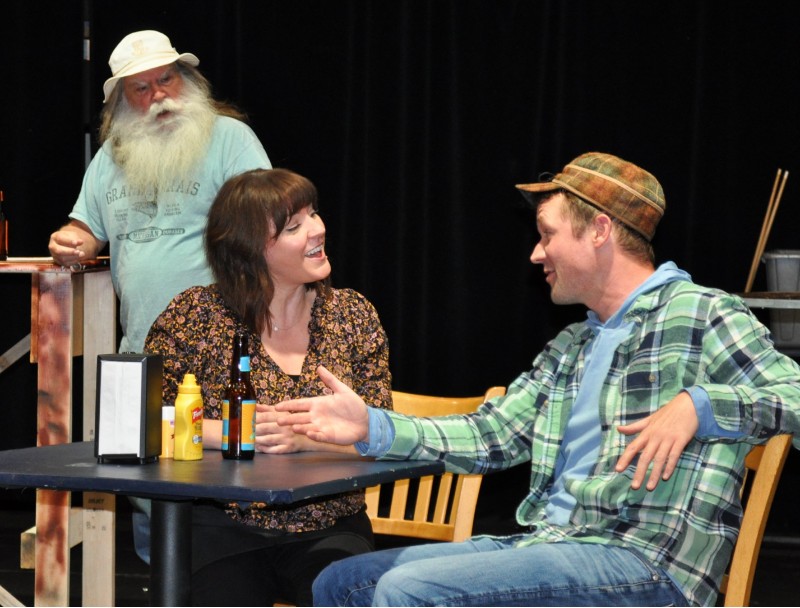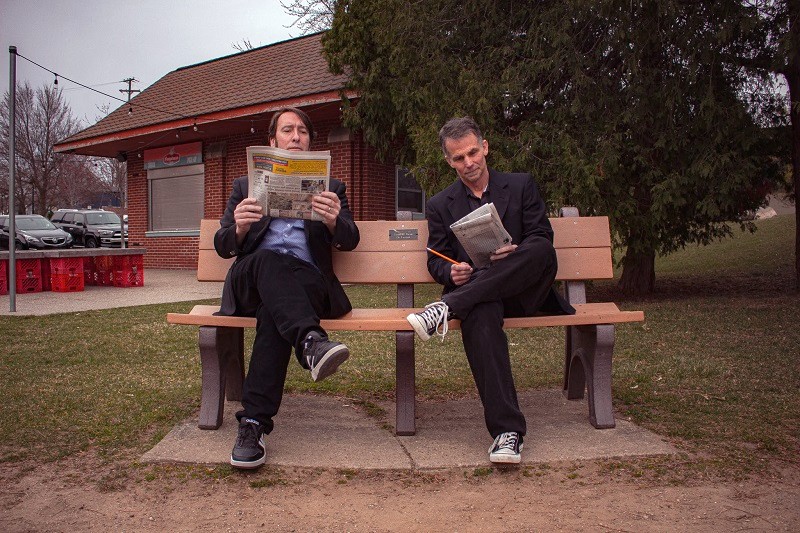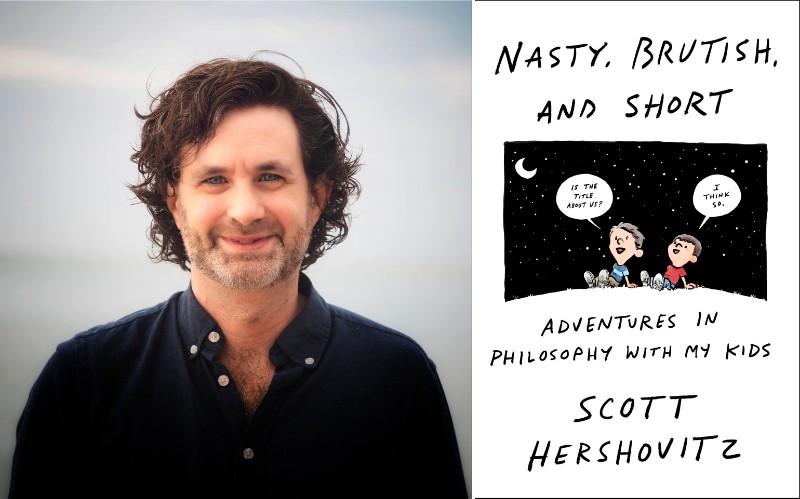Good C.A.R.Ma.: Peter Madcat Ruth's latest band and album mix Indian music, blues, jazz, and more

Ann Arbor’s beloved harmonica virtuoso Peter Madcat Ruth recorded a new album, Cosmic Convergence, with his genre-jumping C.A.R.Ma. Quartet, which is playing a concert at The Ark on Sunday, November 6. The Quartet gets its name from the initials of the band members’ names: John Churchville (drums); Brennan Andes (bass); Dan Ripke (electric guitar); and the Ma taken from the first two letters of Ruth’s longtime Madcat alias.
Ruth's a musical explorer whose career goes back five decades and includes recordings with everyone from jazz pianist Dave Brubeck to funk king George Clinton to classical composer William Bolcom to word-jazz artist Ken Nordine. Cosmic Convergence continues Madcat's exploratory ways, moving in all sorts of satisfying directions by deftly incorporating elements of Indian music, folk, blues, jazz, Americana, and more. (The album isn't streaming yet, but CDs will be available at the show and vinyl at a later date.)
In a recent phone conversation, Ruth talked about the origins of the C.A.R.Ma. Quartet, his nonexistent retirement plans, and the inspiration he got from playing music with Brubeck.
Now and Later: H.R. Webster engages in associative thinking to form her poetry in “What Follows”

H.R. Webster’s poems in What Follows scrutinize the space after trauma, in womanhood, around death, and when someone has gone too far.
The poet does not shy away from what is unfolding but rather turns an intent eye on each scene where “There is the calf’s share / blooming in my coffee” or “A killdeer faking it in the parking lot.”
In the poem “Ritual,” we learn that things commonly desired and sought after nevertheless disappoint because “It does not light / the growing dark, does not lift its wings in flight.”
Webster’s collection implicates the discomforting present and its aching aftershocks. The titular poem confronts how “Death came and took from you a virginity you did not know you possessed, but guarded, closely.” The poem goes on to ask, “What fruit rots first.”
This question characterizes many of the poems that start at the moment when the experience begins to decay—sometimes right away: “On first dates men often ask how would you rather die, / I kid you not, drowning or fire.”
Newer Jack Swing: Ypsilanti R&B singer Where She Creep was inspired by the past for his debut album, "Feels"

Kyle Love is clear about his primary musical inspiration: the new jack swing sound of the late ‘80s and early ‘90s that melded hip-hop with R&B.
The 32-year-old Ypsilanti singer who performs as Where She Creep has created a fresh twist on that classic sound with his debut album, Feels, which came out earlier this year. He describes it as “healing music” that deals with new-age concepts to explore the politics of love.
“These are songs that aren’t afraid to be vulnerable, touching on the framework of healthy relationship dynamics and what honoring some of these values might look like and what they might not look like,” Love said. “It’s here to sharpen your belief system, make you want to hug a loved one, but most of all, to encourage you to analyze for yourself, for better or for worse.”
Influenced by Michael Jackson and many other soul-singing greats, Where She Creep also cites his cousin Brian Campbell, who taught him songwriting, and his producer and best friend, Pranav Surendran, as inspirations.
After dealing with some setbacks during the pandemic, Where She Creep recently declared he is throwing himself fully into his career, giving it 100 percent of his attention.
Pulp caught up with the singer to talk about Feels, his Chill Place Parties project, and more.
U-M researcher Michelle Segar lays out “The Joy Choice” in her recent book on sensible eating and exercise plans

Exercise and eating both come down to our daily choices, and it does not have to be as hard as it seems, says author Michelle Segar, a lifestyle coach and researcher at the University of Michigan.
In her recent book, The Joy Choice, Segar details a new way to make these decisions, including diagrams that show how to apply her research-based method. She writes:
Our choice is our choice. It no longer represents overcoming perceived deficiencies, following someone else’s rules, or being selfish. We make room for the unanticipated while still meeting our own self-care needs, simultaneously renewing our energetic resources for the people, goals, and projects we care most about.
Segar’s Joy Choice strategy and decision tool were designed to assist you at the point when you and your eating or exercise plans run up against real-life interruptions. The genius of this tactic comes from working with, rather than against, the unanticipated challenges so you can keep making strides toward your target despite life’s unwelcome twists.
One way that Segar helps address these “choice points”—the moments when you are faced with continuing to pursue your exact plan or changing course—is by identifying the ways that both internal and external issues could derail making your desired healthy choice. Segar calls these forces “decision disrupters.” An example of one of the four disruptors that she features is “accommodation,” about which Segar writes, “[T]here’s real science about the damage that can occur when our automatic and consistent go-to is giving other people’s needs priority over our own. As with most things in life, seeking balance and finding compromise is key.” While our decision disrupters may not be readily apparent, we can address them once we learn about them—and prevent them from upending our goals moving forward.
Segar calls “choice points” the “true place of power” because it is at these times when you can make a choice that aligns with your greater goals. Segar says:
When the exercise and eating goals we have selected (as opposed to those that have been imposed on us by society or others) align with our core values, needs, and priorities, they become integrated into and a natural affirming part of who we are. This in turn increases the value proposition for making choices that favor healthy eating and regular exercise. Because we no longer feel that we should make those choices, our internal conflicts with them are gone or greatly reduced, and so now we want to make them and make them more effortlessly.
Making decisions that support your healthy behavior goals becomes enjoyably straightforward with Segar’s Joy Choice strategy.
AADL hosted Segar for a reading on June 24, a video of which is included at the end of this post. This fall, I interviewed her about The Joy Choice.
"North Country" Fare: The 40th-anniversary edition of Jay Stielstra's folk opera sails into The Ark

Forty years ago, Jay Stielstra was playing his songs to enthusiastic listeners around Ann Arbor, mostly at Mr. Flood’s Party, a bar that once stood on 120 West Liberty. Bouyed by the response to his tunes, the folk singer decided to write some continuity and put them together in a play, North Country Opera.
“The main thing that carries it are the songs,” Stielstra says. “I asked other musicians I knew in Ann Arbor if they wanted to be in a play, and they all said yes.”
Stielstra knew one of the founders of the Performance Network, the late David Bernstein, and brought the work to him. “David was very enthusiastic,” Stielstra says, and North Country Opera premiered in 1982 as the fledgling theater's second production.
The play was revived in 1992, 1993, and 2003 in Ann Arbor, and in 2022 it toured Northern Michigan, with the 89-year-old playwright along for the ride. North Country Opera returns to Ann Arbor for one night, October 18, at The Ark.
Frances Kai-Hwa Wang reaches for poetry “when argument fails, when there can be no objectivity, when things have become personal”

Frances Kai-Hwa Wang’s new book, You Cannot Resist Me When My Hair Is in Braids, begins with desire and dreams and concludes with anger, love, and home. In the pages in between, the expansive lyric essays travel broadly from Kathmandu, which is “the ancient city of my youth while I am disappearing into summer, fire, and sea,” to the basement of the Detroit Institute of Arts where “we discover the museum’s stash of old film reels.” The essays consider how to have one’s own dreams, embrace identity, experience violence against identity, and engage with family (not to mention ex-family members).
Leaving a place and leaving a marriage become both a backdrop and an integral part of the essays. In “Texting Nostalgic for Kathmandu,” Wang writes:
Tasty Times: Mercury Salad Explores Delectable Life Experiences on “Volume 3” EP

Brooke Ratliff says she’s no good at writing traditional love songs because “they’re either really mushy, or they’re really sad”—so she doesn’t even try on Volume 3, Mercury Salad’s latest EP.
Instead, the Ypsilanti folk-rock trio of Ratliff (vocals, guitar, percussion), Kurt Bonnell (guitar, harmonica), and Kyle Kipp (bass) explores the uncertainties of a promising relationship on “Best Guess,” the EP’s spirited opener.
“To me, this song could go either way. It could be that it’s unexpected, or it could be that the person is being overly optimistic,” said Ratliff with a laugh. “I wanted to do something sweet-natured and slightly romantic, but I couldn’t go all the way there. That’s why it’s my ‘Best Guess’ this is gonna work out great.”
Business Casual: Crossword Smiles Fashions Classic and Experimental Sounds on “Pressed & Ironed” Album

For their debut album, Crossword Smiles brings a “business-casual” sensibility to the indie-pop world.
The Grand Blanc-Dexter duo of Tom Curless (vocals, guitars, drums, keys) and Chip Saam (vocals, bass, guitars) strikes an optimal balance between classic pop-rock song structures and experimental college-rock textures on Pressed & Ironed.
“We want to show the duality of our lives,” Curless said. “We work day jobs, and then we put the pressed shirts away and put on our Converse [sneakers] and play rock ‘n’ roll.”
With button-up shirts cast aside and well-worn sneakers in place, Crossword Smiles fashions 10 artful, melodic tracks on Pressed & Ironed that remove the wrinkles of the past and provide a smooth outlook for the future.
“Tom and I both take our lyrics somewhat seriously, and I don’t think either of us writes something just to write something because it sounds good,” Saam said. “We both put some thought and work into our lyrics, and it’s awesome when people really pay attention, especially if it makes some kind of impact.”
Sweet and Dour: Ann Arbor's Seaholm mixes pop-punk with dark lyrics on "It's Raining Outside"

If there was any doubt that a good pop-punk/power pop band can still cut through the musical clutter and make a powerful statement, Ann Arbor-based Seaholm proves it with style.
For example, check out “Cough Syrup,” a terrific single and video from the band’s new album, It’s Raining Outside. In just 2:11, the band offers a tremendous burst of musical energy, memorable visuals, and an earworm (“Can you please tell me what’s going on?”) that will stick with you for days.
It’s Raining Outside is a short, sharp album that displays the band’s talent for combining dynamic musicianship with thoughtful lyrics. On “Weatherman,” the album’s keystone, they sing: “What’s the weather like today? / I want the rain to wash me away / Cleanse me of my guilt and take me home / Say goodbye to the life that I’ve always known.”
Although an earlier lineup did some recordings, It’s Raining Outside fully introduces the current band, which consists of Pat Ray on guitar and vocals, Austin Stawowczyk on bass and vocals, and Kris Herrmann on drums and vocals.
Ray answered a few questions about Seaholm's history and new album via email.
Human Nature: U-M prof Scott Hershovitz talks philosophy with his kids in the book "Nasty, Brutish, and Short"

U-M professor Scott Hershovitz divulges conversations with his two young sons and connects those chats to philosophical concepts in his new book, Nasty, Brutish, and Short: Adventures in Philosophy With My Kids. Among the topics are swearing, sports, racism, and religion.
Hershovitz delves into both questions that his children raise and questions that he and his wife, Julie, face as parents. What makes the book so approachable is that the conversations are set in humous, relatable, day-to-day scenarios. For example, the subject of individual rights emerges when one of the children, Hank, takes ages to decide what to have for lunch after being offered a quesadilla or hamburger:


































